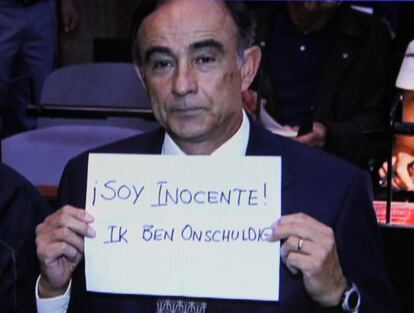"Death flights" pilot arrested in Spain goes on trial in Argentina
Julio Alberto Poch allegedly confessed to role in disappearances while drunk

A man who is alleged to have been one of the infamous pilots who flew the so-called "death flights" for the Navy Mechanical School (ESMA) during Argentina's Dirty War (1976-1983) declared his innocence on Monday before a Buenos Aires federal court. Julio Alberto Poch, a former pilot for the Dutch airline Transavia, was arrested in Valencia, Spain in 2009 while he was traveling with his family. The 60-year-old Argentinean was extradited to his native country the following year to face 30 kidnapping and murder charges.
In 2003, Poch, under the influence of alcohol, reportedly confessed to two co-workers that he participated in the disappearances of hundreds of arrested dissidents held at the notorious ESMA. The naked prisoners were drugged and tied up and dropped from a plane into the River Plate. Many bodies washed up on the Uruguayan shore.
Poch maintains that his words were misinterpreted.
In 1995, Captain Adolfo Scilingo was one of the first pilots to confess to taking part in the secret flights. He made his confession to journalist Horacio Verbitsky before traveling voluntarily to Spain to cooperate with the investigation of former High Court Judge Baltasar Garzón. Scilingo is serving a long jail sentence following his convictions.
This was war. It is normal for people to die during times of war," he reportedly said
Poch retired from the navy in 1980 and began working for Aerolíneas Argentina. In 1989, he moved to the Netherlands to work for Transavia, a low-cost carrier owned by KLM and Air France. Six years later he became a Dutch citizen.
About 10 years ago, at a dinner with 12 colleagues in Bali, two of those present asked Poch about the father of Princess Máxima of the Netherlands, who served as agriculture minister under the Jorge Videla dictatorship. Tim Weert and Edwin Brouwer testified in 2008 that Poch had told them they had the wrong idea about what had occurred in Argentina during the dictatorship.
According to Weert, at one point Poch said there were moments "when he said he was on board the plane and would throw the people off."
"They were terrorists, and this was war. It is normal for people to die during times of war," he reportedly said, adding: "There weren't any problems, because they were drugged."
But Poch told the Buenos Aires court that he was on trial because of "a terrible misunderstanding."
"It is embarrassing that they violently pulled me away from my home just for issuing opinions about Argentinean politics," he said. Poch's family has created a foundation in Argentina in his defense. Meanwhile, Weert and Brouwer say that they have received emails asking them to change their testimony.
Poch, meanwhile, has tried to prove his innocence by presenting log books in which none of the death flights were recorded.
Tu suscripción se está usando en otro dispositivo
¿Quieres añadir otro usuario a tu suscripción?
Si continúas leyendo en este dispositivo, no se podrá leer en el otro.
FlechaTu suscripción se está usando en otro dispositivo y solo puedes acceder a EL PAÍS desde un dispositivo a la vez.
Si quieres compartir tu cuenta, cambia tu suscripción a la modalidad Premium, así podrás añadir otro usuario. Cada uno accederá con su propia cuenta de email, lo que os permitirá personalizar vuestra experiencia en EL PAÍS.
¿Tienes una suscripción de empresa? Accede aquí para contratar más cuentas.
En el caso de no saber quién está usando tu cuenta, te recomendamos cambiar tu contraseña aquí.
Si decides continuar compartiendo tu cuenta, este mensaje se mostrará en tu dispositivo y en el de la otra persona que está usando tu cuenta de forma indefinida, afectando a tu experiencia de lectura. Puedes consultar aquí los términos y condiciones de la suscripción digital.








































